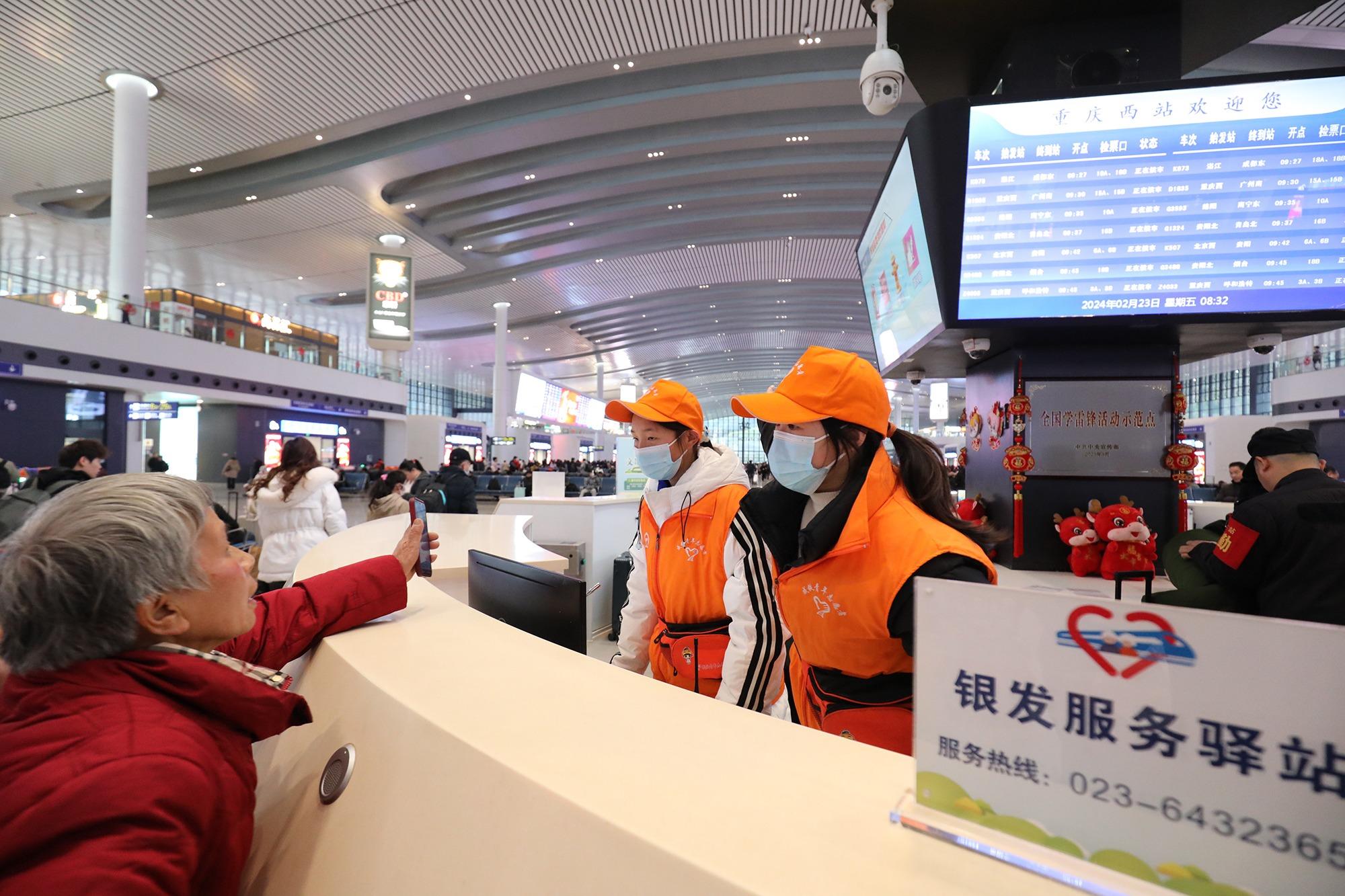Airline travel picks up amid offseason as prices typically drop in March
 Volunteers offer senior-focused services at Chongqing West Railway Station in February 2024. (SUN KAIFANG / FOR CHINA DAILY)
Volunteers offer senior-focused services at Chongqing West Railway Station in February 2024. (SUN KAIFANG / FOR CHINA DAILY)
When Hong Jianyi, a 70-year-old retiree from Beijing, and his family went on a holiday to Iran in late January, it was an experience that exceeded all his expectations.
Hong remembers being hugely impressed by Iran's rich history and its friendly people during his trip, which came before the Spring Festival holiday rush began.
A growing number of sophisticated travelers, mostly elderly Chinese, are venturing far out of the country this spring, heading to niche destinations such as Serbia, Morocco and Tunisia, benefiting from lower hotel and flight rates after the Chinese New Year break.
Prices of hotel rooms and flight tickets to popular tourist destinations have dropped by nearly 40 percent in March, considered offseason for travel, compared with the Spring Festival period, according to Qunar, a Beijing-based online travel agency.
READ MORE: Spring Festival travel: ASEAN among most popular hotspots
For tourists aged above 55, the average flying distance exceeds 1,200 kilometers this month, over 30 percent farther than last year, Qunar has found.
The proportion of the elderly among all outbound travelers has nearly rebounded to over 9 percent, close to pre-pandemic levels, Qunar said.
"March is suitable for spring outings, but it has been an offseason for travel for many years. This year, more travelers have embarked on their journeys in March, especially for outbound trips," said Xiao Peng, a researcher at the big data research institute of Qunar. "The increase in passenger volumes indicates strong demand, and the falling prices of flight tickets and hotels have significantly stimulated demand."
"The booking volumes of outbound travel by elderly consumers have surged compared with the same period last year, indicating that the capacity of outbound flights and overseas receptions has gradually recovered, and elderly Chinese are showing a strong willingness to spend," Xiao said.
A large number of elderly Chinese born in the 1960s are tech-savvy. Online bookings and languages are not barriers for them, and more than 80 percent of such elderly customers travel without being accompanied by their children, Xiao added.
The number of travel bookings by children and students under the age of 25 has declined, while the growth in bookings has been most significant for middle-aged and elderly travelers, Qunar said.
Thanks to visa-free policies for Chinese visitors, Thailand, Malaysia, and Singapore rank among the top five overseas destinations in terms of flight booking volumes in March, and the number of Chinese travelers who booked flight tickets a few days in advance has significantly increased, Qunar said.
 Chinese tourists receive a warm welcome on arrival in Budapest in March 2023. (PHOTO / XINHUA)
Chinese tourists receive a warm welcome on arrival in Budapest in March 2023. (PHOTO / XINHUA)
More flights
Airlines are launching more flights to Southeast Asia to satisfy the growing travel demand.
Guangzhou-based China Southern Airlines launched its first direct flight — an Airbus A321 aircraft — connecting Beijing Daxing International Airport and Singapore on March 7.
The route, three times a week initially, will turn into daily trips from March 31. Following the launch of the new route, China Southern now operates 45 weekly flights between China and Singapore. The carrier said it will continue to increase its international flight capacity by launching and resuming more international flights.
In January, China and Thailand signed an agreement on permanent mutual visa exemption, which became effective on March 1. Earlier, the visa exemption policy between the two countries had been temporary.
Now, a one-way flight ticket to Bangkok from domestic cities such as Shanghai; Guangzhou, Guangdong province; and Chengdu, Sichuan province all carry price tags of around 600 yuan ($83) each. Flights departing between 6 am and 9 am are popular among this set, given the cheaper prices, Qunar said.
This year, Thailand will hold various events across the country to celebrate Songkran, the world's largest water festival, with a total of 21 days of celebration and revelry from April 1 to 21.
"Fun and interesting festivals are becoming a benchmark for tourism, and featured activities will help drive local consumption," Xiao said.
In China, the period between April 13 and 15 is better known as the water splashing festival and is also the New Year period for the Dai ethnic minority, when people splash water on each other to send and receive blessings.
Many travelers have booked their flights to Xishuang Banna Dai autonomous prefecture in Yunnan province in advance, and the booking volume has doubled compared to the same period of 2023.
 A staff member (right) hands out souvenirs to Chinese tourists at a Ferrari-branded theme park in Abu Dhabi in February 2024. (PHOTO / XINHUA)
A staff member (right) hands out souvenirs to Chinese tourists at a Ferrari-branded theme park in Abu Dhabi in February 2024. (PHOTO / XINHUA)
This year, there are more flights from various cities within the country to Xishuang Banna, and the average price of flight tickets has fallen by about 30 percent.
Most of the domestic tourists are from Shanghai, Chongqing, Hangzhou, Zhejiang province, Changsha, Hunan province, and Guangzhou, Guangdong province, according to Qunar.
As the grandest traditional event of the Dai ethnic group, the water splashing festival is celebrated in various places in Yunnan, such as Mangshi, Pu'er, Ruili, and Lincang.
Some tourists prefer to explore rich folk customs and experience the festive atmosphere in small towns, and the booking volumes of hotels in such places have jumped 40 percent from the same period last year, Qunar found.
After the frenetic travel rush during the Spring Festival, the market is expected to embrace a long window during which one can travel by avoiding holiday peaks.
ALSO READ: Minister: China to improve home-based elderly care
On some popular domestic routes, the prices of flight tickets could be lower than train tickets. For instance, the price of a one-way flight from Beijing to Sanya, the tropical island of Hainan province, could be lower than 400 yuan, said Tuniu Corp, a Nanjing, Jiangsu province-based online travel agency.
By the end of the 14th Five-Year Plan (2021-25) period, more than 100 million healthy elderly Chinese — who have strong purchasing power — are expected to travel frequently. Sales of the elderly tourism market are forecast to hit 1 trillion yuan, according to a projection by the China Tourism Academy.
Tourist spots that can meet diverse and personalized demands will become sought-after and desirable among travelers.
Cities that utilize factors such as modern technologies, culture and art may also become popular tourist destinations, said Dai Bin, president of the Chinese Tourism Academy.
"The increasingly personalized travel demand from Chinese consumers has provided travel agencies with more business opportunities and potential for innovation. While boosting consumer confidence, it is expected to significantly promote the recovery and growth of the Chinese economy and the global tourism market," Dai added.


